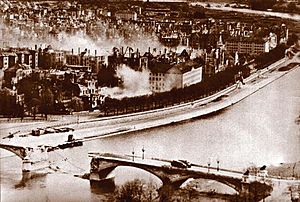Battle of Würzburg (1945) facts for kids
Quick facts for kids Battle of Würzburg |
|||||||
|---|---|---|---|---|---|---|---|
| Part of the Western Allied invasion of Germany | |||||||
 The destroyed Ludwigsbrücke |
|||||||
|
|||||||
| Combatants and Leaders | |||||||
| Commanders and leaders | |||||||
| Richard Wolf | Harry J. Collins | ||||||
| Units involved | |||||||
| Unknown | 42nd Infantry Division | ||||||
| Strength | |||||||
| est. 3,500 | est. 5,000 | ||||||
| Casualties and losses | |||||||
| est. 1000 dead (including civilians) | est. 300 dead | ||||||
The Battle of Würzburg was a fight that took place from March 31 to April 6, 1945. It was part of the Western Allied invasion of Germany during World War II. This battle ended with the American 42nd Infantry Division, also known as the "Rainbow" division, capturing the city of Würzburg in Upper Franconia, Germany.
Contents
What Happened in the Battle of Würzburg?
The city of Würzburg was strongly defended by German forces. Their leader, Richard Wolf, followed orders from Adolf Hitler to fight very hard. This was the first serious resistance the American division faced after crossing the Rhine river.
German Defenses and Retreat
American forces first captured Hettstadt, a town northwest of Würzburg. This forced the German soldiers to move back. They retreated to the other side of the Main River. They had hoped for more soldiers to help them, but no reinforcements arrived.
Artillery Fire and Blown Bridges
American artillery (large guns) were set up on high ground. These were the hills of Nikolausberg and Katzenberg. From there, they could fire shells at the city. German artillery was on the opposite side of the Main River, in Keesberg.
On Monday, March 31, 1945, the Germans blew up three important bridges in Würzburg. The Ludwigsbrücke was destroyed first, then the Alte Mainbrücke. Finally, the Luitpoldbrücke (now called Friedensbrücke) was also blown up. This made it impossible for American troops to cross the river using the bridges.
Crossing the Main River
On Tuesday night, some American soldiers, called GIs, managed to cross the Main River. They used small boats near where the Ludwigsbrücke used to be. They didn't face much resistance at first.
The next day, the Americans set up a secure area on the other side of the river. However, German snipers, hidden in houses, began to shoot at the American troops. Further north, near the Old Main Bridge, American engineers built a pontoon bridge. This temporary bridge was finished on April 3. It allowed light vehicles and more soldiers to cross the river.
Fierce City Fighting
The most intense fighting happened on Wednesday and Thursday. This was urban warfare, meaning battles fought inside a city. Würzburg's city center was already in ruins from earlier Allied bombing raids.
German forces tried to counter-attack near the three main bridges. But they did not have enough weapons or supplies. Their attack failed, and Würzburg eventually fell to the American forces.
The End of the Battle
By Friday, April 6, 1945, the last German units fighting in the outer parts of the city were defeated. All resistance stopped. This marked the end of the Battle of Würzburg, with an American victory.
 | Sharif Bey |
 | Hale Woodruff |
 | Richmond Barthé |
 | Purvis Young |

